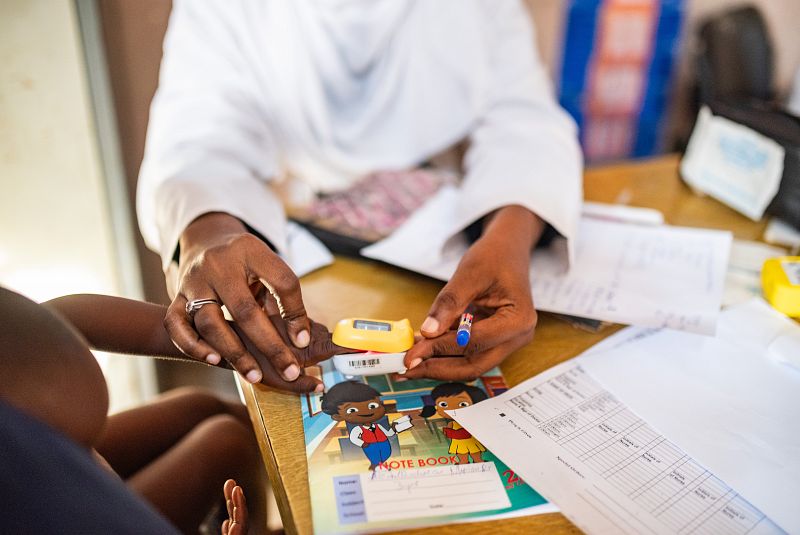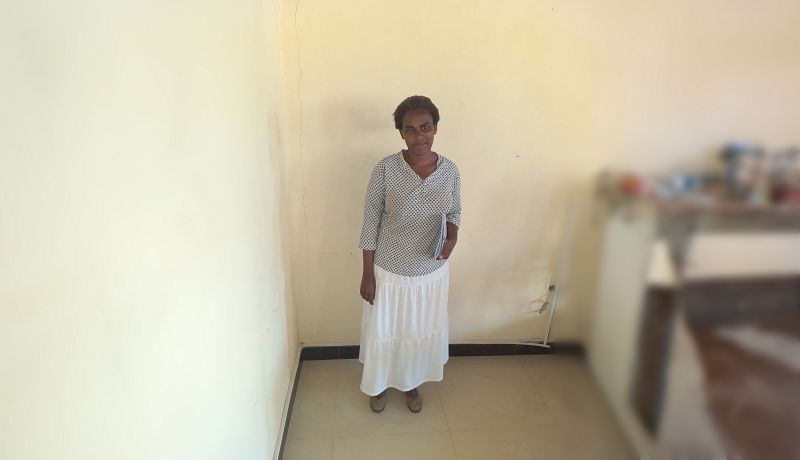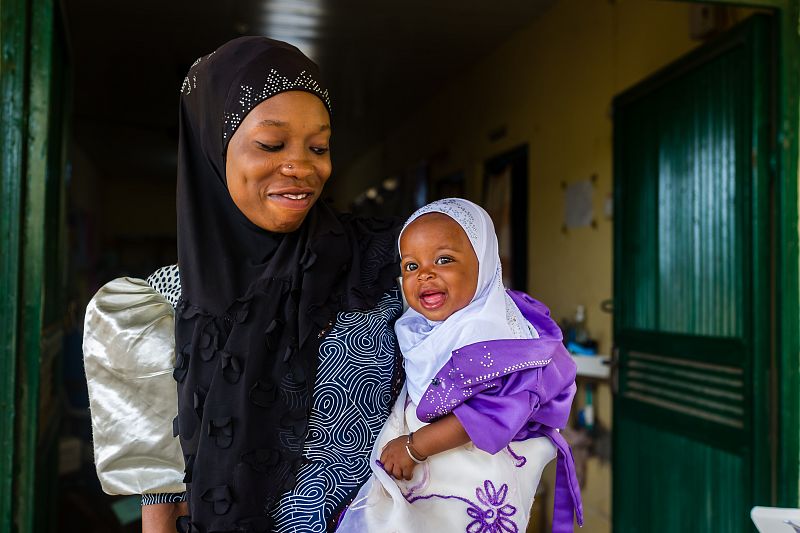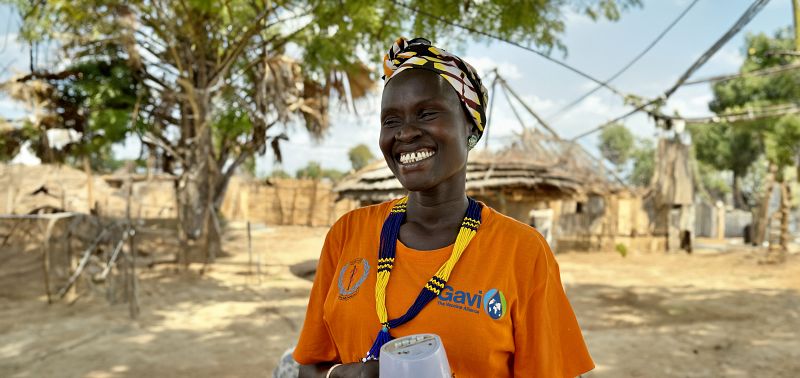Publications
Explore our publications to find useful evidence, lessons and recommendations from our work across Africa and Asia
Type
- Advocacy and positioning
- Advocacy briefs
- Advocacy reports
- Annual reviews
- Brochures
- Capacity statements
- Position statements
- Conference
- Briefing notes
- Posters
- Presentations
- Guidance and toolkits
- Guidance
- Training materials
- Learning
- Case studies
- Infographics
- Insight briefs
- Learning briefs
- Learning papers
- Newsletters
- Research and Technical
- Journal articles
- Project briefs
- Project reports
- Research briefs
- Synopses
- Technical briefs
Keyword
- ASTMH
- Advocacy
- COVID-19
- Capacity development
- Case management
- Case study
- Chemoprevention
- Child survival
- Climate
- Community delivery
- Costing and economic impact evaluation
- Data-informed decision-making
- Diagnosis
- Digital health
- Elimination
- Evidence generation
- Gender
- Genetic modification
- Health financing
- Health system strengthening
- Learning
- Logistics
- MNCH
- Malaria in pregnancy
- Monitoring and evaluation
- PMC
- Philanthropy
- Policy development
- Private sector
- Quality improvement
- Research
- Resistance management
- SBC
- SDGs
- SMC
- Scaled implementation
- Scholarships
- Surveillance
- Treatment
- Universal health coverage
- Urbanisation
- Vaccines
- Vector control
- Webinars
- iCCM
Diseases
Country
Language
Reset all search optionsCurrent search filters (9 results match ALL terms):
IPTi
 16/06/2022
Journal article
16/06/2022
Journal article
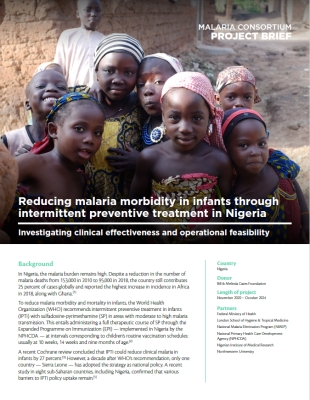 31/03/2021
Project brief
31/03/2021
Project brief
 07/01/2021
Journal article
07/01/2021
Journal article
 27/02/2020
Journal article
27/02/2020
Journal article
 27/06/2019
Journal article
27/06/2019
Journal article
 19/07/2018
Journal article
19/07/2018
Journal article
 28/08/2015
Journal article
28/08/2015
Journal article
 11/11/2014
Journal article
11/11/2014
Journal article
 12/07/2010
Journal article
12/07/2010
Journal article
IPTi
 16/06/2022
Journal article
16/06/2022
Journal article
The private sector market for malaria rapid diagnostic tests in Nigeria: Results of the 2018 market survey
Increasing household knowledge of rapid diagnostic tests (RDTs) may aid increasing demand, while subsidised RDTs may address supply and price issues. 16/06/2022Increasing household knowledge of rapid diagnostic tests (RDTs) may aid increasing demand, while subsidised RDTs may address supply and price issues.
 31/03/2021
Project brief
31/03/2021
Project brief
Reducing malaria morbidity in infants through intermittent preventive treatment in Nigeria
This study will assess the clinical effectiveness and operational feasibility of intermittent preventive treatment in infants in Nigeria. 31/03/2021This study will assess the clinical effectiveness and operational feasibility of intermittent preventive treatment in infants in Nigeria.
 07/01/2021
Journal article
07/01/2021
Journal article
Challenges and strategies for conducting clinical research during the COVID-19 pandemic: Experiences from resource-limited settings
We initiated an observational case series study to assess the magnitude and clinical consequences of coinfection of COVID-19, malaria and other common infections. 07/01/2021We initiated an observational case series study to assess the magnitude and clinical consequences of coinfection of COVID-19, malaria and other common infections.
 27/02/2020
Journal article
27/02/2020
Journal article
Evaluation of a capacity building intervention on malaria treatment for under‑fives in rural health facilities in Niger state, Nigeria
This study assessed the effect on malaria diagnosis and prescription practices among febrile under-fives in rural health facilities. 27/02/2020This study assessed the effect on malaria diagnosis and prescription practices among febrile under-fives in rural health facilities.
 27/06/2019
Journal article
27/06/2019
Journal article
Community engagement and mobilisation of local resources to support integrated Community Case Management of childhood illnesses in Niger state, Nigeria
This study wanted to document the process and scale achieved for community engagement and mobilisation to foster ownership and sustainability. 27/06/2019This study wanted to document the process and scale achieved for community engagement and mobilisation to foster ownership and sustainability.
 19/07/2018
Journal article
19/07/2018
Journal article
Community understanding of the concept of pre-referral treatment and how this impacts on referral related decision-making following the provision of rectal artesunate: A qualitative study in western Uganda
Background Successful pre-referral treatment with rectal artesunate (RA) for suspected severe malaria requires operational linkages between community health workers (CHWs) and referral facilities, acceptance of pre-referral treatment and adherence to referral… 19/07/2018Background Successful pre-referral treatment with rectal artesunate (RA) for suspected severe malaria requires operational linkages between community health workers (CHWs) and referral facilities, acceptance of pre-referral treatment and adherence to referral practices by CHWs and caregivers. This qualitative study investigated how…
 28/08/2015
Journal article
28/08/2015
Journal article
Estimating the cost of referral and willingness to pay for referral to higher-level health facilities: a case series study from an integrated community case management programme in Uganda
Background Integrated community case management relies on community health workers managing children with malaria, pneumonia, diarrhoea, and referring children when management is not possible. This study sought to establish the cost… 28/08/2015Background Integrated community case management relies on community health workers managing children with malaria, pneumonia, diarrhoea, and referring children when management is not possible. This study sought to establish the cost per sick child referred to seek care from a higher-level…
 11/11/2014
Journal article
11/11/2014
Journal article
Multi–country analysis of routine data from integrated community case management (iCCM) programs in sub–Saharan Africa
Aim To identify better performing iCCM programs in sub–Saharan Africa (SSA) and identify factors associated with better performance using routine data. Methods We examined 15 evaluations or studies of integrated community case management… 11/11/2014Aim To identify better performing iCCM programs in sub–Saharan Africa (SSA) and identify factors associated with better performance using routine data. Methods We examined 15 evaluations or studies of integrated community case management (iCCM) programs in SSA conducted between 2008 and 2013 and…
 12/07/2010
Journal article
12/07/2010
Journal article
